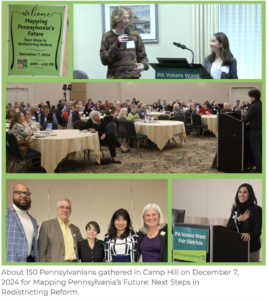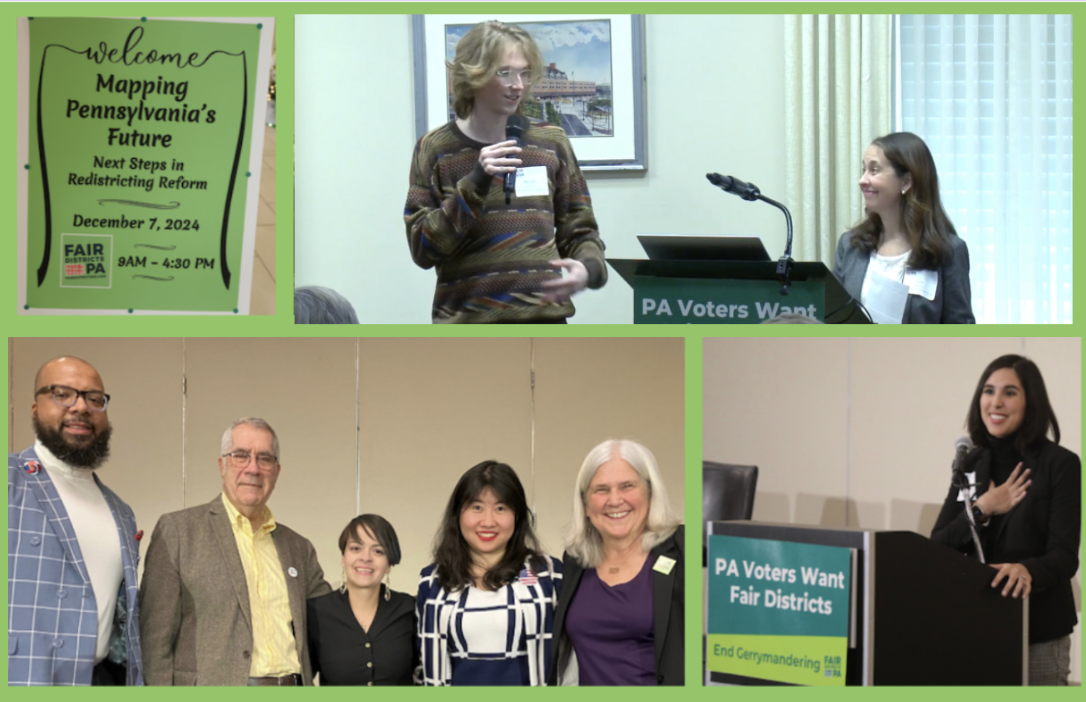On December 7, Noah Kocher, undergraduate member of the Political Empathy Lab research team, and I spoke at the Fair Districts Pennsylvania Conference in Harrisburg. Fair Districts PA is an organization that works towards the just apportionment of Pennsylvania’s congressional districts, trying to redraw gerrymandered districts that unfairly keep one political party in power even if they are a poor fit for the district they are slated to represent.
It was an honor to be invited, and we were able to interact with the many members who attended, sit in on other panel discussions and marvel at the matchless leadership of Fair Districts PA chair, Carol Kuniholm. After our presentation which can be viewed here, we were approached by folks with additional questions. One question has not left my mind. An audience member asked, how do you engage with folks who have not actually had conversations themselves but have listened to conversations on podcasts and now imagine that they have had those conversations?

It is a fascinating question. I have read a bit about para social relationships, the way that when we watch television shows, we can start to imagine ourselves friends with the characters on the show (especially when we binge watch whole seasons at a time). The concept however, of listening to a conversation on a podcast and putting ourselves into the conversation is not something I have read much about but has the gears turning.
This is a podcasting moment. The digital “air waves” are saturated with podcasting content. People are exposed to endless hours of other people talking but are not necessarily having challenging conversations themselves. They are recipients and are consciously or unconsciously absorbing both information and conversational techniques and patterns. It can be helpful, especially if you have not yet made up your mind about something to hear it articulated. At the same time, listening to belief systems with rationales already worked out, can serve as proxy conversations, replacing the important process of developing your own ideas in conversation with others.
What does this mean especially around political socialization and identity formation?
Some religious traditions believe that it is important when adopting new beliefs to be able to state those beliefs aloud. In Christianity, especially in the more charismatic strains of Protestantism that developed in the 20thcentury, giving your testimony is a way to state before others that you believe in Jesus Christ. This public statement, especially if your faith is newly adopted, can serve to solidify those beliefs into a new public identity as a Christian. What is fascinating to me is the idea that when you articulate your autobiography including how you came to your faith alongside of what you now believe, you integrate that belief into your identity. The public statement of it, helps move it from emotional and spiritual to rational as you put words around the experience. Articulating your beliefs publicly also serves as an accountability mechanism as now other people know what you believe and how you developed those beliefs. Finally, because the testimony is given before an audience of people who also believe, it serves as a way of further attaching yourself to a group of fellow believers.
Not all beliefs, like religious beliefs, translate into identities but as political beliefs have become increasingly polarized, political party identification has moved for many into an identity. (Liliana Mason). Affective polarization attaches feelings to ingroup and outgroup members and people are less likely to date, want to work with or even discuss sports with people of the opposite political party. (Matthew Levendusky). So, in an age of affective polarization, political belief formation matters as it adheres you to a group. Stating what you believe matters as it defines whether you are in the group or not. Feelings towards the outgroup have grown in their intensity and while certain policy agendas can become flash points to delineate us against them (think about transgender issues during the 2024 election), the labels of “liberal” or “conservative” do not have to match with coherent policy agendas to inspire the strong feelings of ingroup or outgroup identity.
As a point of contrast, when I was an undergraduate at Penn nearly 25 years ago affective polarization was not something I experienced. Though Penn was widely believed to be politically liberal there was far less emphasis from my vantage point on political party alignment per se. In fact, it barely came up in conversation. I do not remember consciously stringing together my political views into a coherent platform and aligning it to a political party and then having lots of feelings towards co partisans and out partisans. Largely because news was only available via televised broadcasts at set times (cable news was available but it was young) or the printed newspaper, it was very easy for me to tune out completely for months at a time all that was going on in the world and immerse myself fully in my coursework. There were entire semesters where my mind lived in Medieval England or in France during the Enlightenment.
All this to say, I did not have a sophisticated set of political beliefs, they were not augmented or challenged by new information on a daily basis and I was not able to listen to conversations as people argued for or against their beliefs. Radio existed of course but I rarely listened to the radio as it was not accessible digitally as it is now. I did not have the opportunity to listen and then superimpose myself onto someone else’s well-articulated and reasoned belief system and adopt it as my own. I just simply had a vague sense of myself as a political actor who in the weeks leading up to the first Tuesday in November was more engaged. Graduate school, especially while studying American Politics, became an opportunity for me to start thinking carefully and start to better articulate my beliefs but it was a slow process and I felt little external pressure around my belief articulation and formation.
But back to podcasts, I love them and have several that I listen to regularly. I do however take quite seriously the question raised by the Fair Districts PA member and I continue to ponder its implications for our political discourse both at the micro and macro level. If we are listening to others confidently outline and defend their political beliefs in conversation as a proxy for conversations that we, I would argue, need to have, how does this impact the conversations we have with others and the conversations we have with ourselves? In passively absorbing and then adopting the beliefs, conversation patterns and conversational experience of others what do we gain and what do we lose?
Conversation is an active process and in it we work out, like in a gym, certain techniques and muscles. We refine our ideas alongside of others, putting into words, sometimes for the first time things bouncing around in our heads. Describing ideas to others requires a kind of structure that they do not need when they live in your own head. Also, presenting ideas to others and hearing their questions, can make ideas less nebulous and more clearly defined. My colleague, Ian MacMullen urges students to imagine what he calls an “epistemic peer” who holds the opposite view on an issue than one they might hold and articulate out loud what that conversation might be like. As I understand it, an epistemic peer is respected because they are like you in education and intelligence so you need to be on your toes when you make the case for your idea.
Sometimes it is useful to listen to others foray into tough conversations before you have them and for that reason, podcasts and other modalities can be critical. My colleague, Sarah Ropp , uses graphic novels in her classes so that students can literally see conversation in action. Students must then try to depict a story or conversation from their own life in a graphic novel format. This is a fascinating way to unpack the dynamics of conversation through a visual medium. It reveals, trains and aids the conversation process especially when it is done, as she does in her class, hand in hand with face-to-face, verbal conversations about the visual conversations.
Human beings are social animals and if it is true that as US surgeon general Vivek Murthy diagnoses, we are facing a loneliness epidemic in the US, conversation is something that is vital to our well-being as it connects us to others. Listening to conversations and imagining yourself in them is important and instructive. At the end of the day, however, nothing beats directly engaging in face-to-face conversation. The less we talk to people and the more we stay in our head around what “the other side” believes, the more we deprive ourselves of the joys of human connection that occur when we are face-to-face having a conversation. The added benefit of getting to refine and articulate your beliefs by speaking them aloud makes your conversations with yourself better.
As MIT social psychologist Sherry Turkle says, “conversation cures.” It seems like there are many social ills facing us in 2025. It can feel overwhelming. Perhaps having a good, real conversation can make us feel better and if many of us are doing it, perhaps it can start to heal some of the brokenness.




